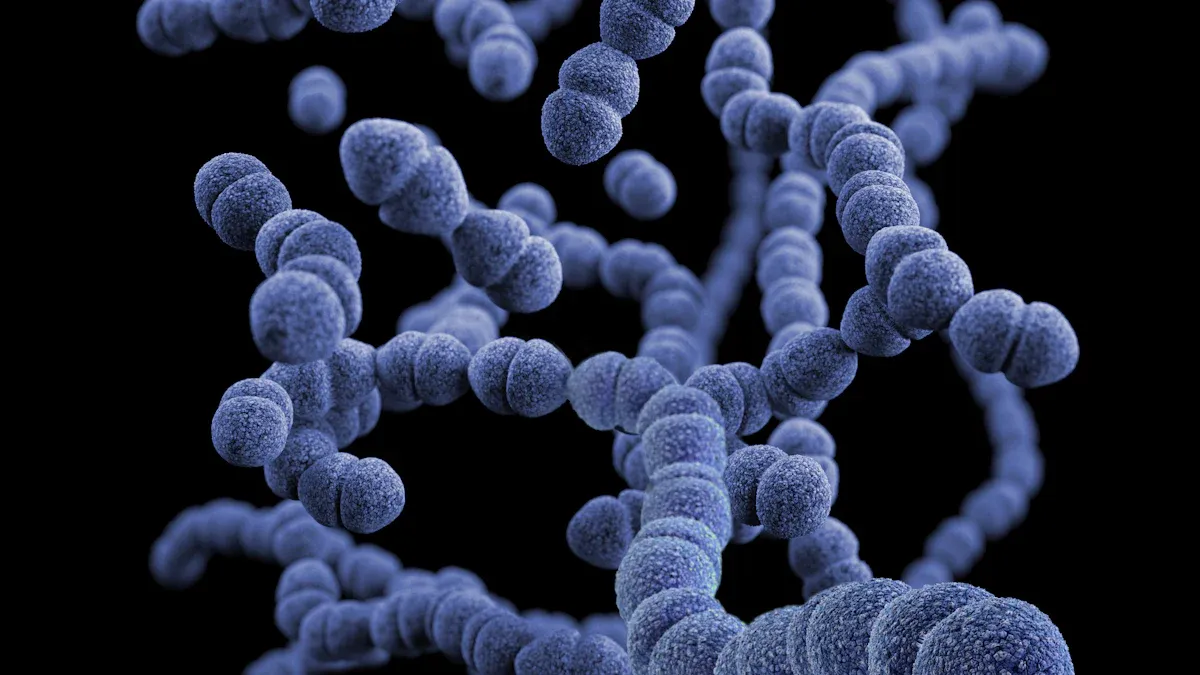Understanding the Role of Probiotics in Cancer Care

Probiotics play a vital role in cancer care by supporting your gut health and reducing inflammation, which is crucial for understanding the role of probiotics in cancer prevention. These beneficial microorganisms help regulate your intestinal flora, potentially lowering cancer risks. For example, probiotics bind and degrade harmful compounds while improving chronic inflammation. Studies show that they reduce inflammatory markers like NF-κB and COX-2, which are linked to colorectal cancer. Additionally, specific strains, such as Lactobacillus casei Shirota, have been associated with decreased breast cancer incidence in women. By maintaining a balanced gut microbiome, probiotics contribute to both prevention and treatment, making them an essential tool in cancer care and highlighting their importance in understanding the role of probiotics in cancer prevention.
Key Takeaways
Probiotics help your gut by adding good bacteria. This may lower cancer risks.
Eating foods like yogurt or sauerkraut gives you more probiotics. These foods can also reduce swelling in your body.
Talk to your doctor before using probiotics. They need to match your cancer treatment.
Probiotics can ease side effects like diarrhea or stomach pain from cancer treatments.
Keeping your gut healthy with probiotics can make your immune system stronger. This helps your body respond better to treatments.
Understanding the Role of Probiotics in Cancer Prevention

How Probiotics Support Gut Microbiome Health
Maintaining a balanced gut microbiome
Your gut microbiome plays a crucial role in maintaining overall health. Probiotics help restore the balance of beneficial bacteria, which can be disrupted by factors like poor diet, stress, or illness. These microorganisms improve intestinal barrier integrity, preventing harmful pathogens from entering your bloodstream. For example, Lactobacillus gasseri OLL2716 has been shown to increase beneficial Lactobacillus species while reducing harmful Clostridium perfringens. This shift creates a healthier gut environment, lowering the risk of harmful metabolites that may contribute to cancer development.
Restoring gut health after disruptions
Cancer treatments, such as chemotherapy and radiation, often disrupt your gut microbiome. Probiotics can help restore gut health by promoting the growth of beneficial bacteria and reducing inflammation. They also produce short-chain fatty acids (SCFAs), which provide energy to colon cells and inhibit cancer cell growth. By improving gut microbiota composition, probiotics enhance your body's ability to recover and maintain a healthy digestive system.
The Connection Between Gut Health and Cancer Risk
Immune system regulation by the gut microbiome
Your gut microbiome directly influences your immune system. Probiotics enhance immune responses by modulating intestinal flora and stimulating regulatory factors that reduce inflammation. For instance, SCFAs produced by probiotics activate GPR109A receptors on immune cells, promoting the development of protective Treg cells. These cells increase IL-10 production, which helps regulate inflammation and supports your body's defense against cancer.
Impact of dysbiosis on cancer development
An imbalanced gut microbiome, known as dysbiosis, can increase your cancer risk. Studies show that breast cancer patients often have lower counts of beneficial bacteria like Lactobacillus and Bifidobacterium. Dysbiosis can lead to chronic inflammation and the production of carcinogenic compounds. By restoring microbial balance, probiotics reduce these risks and support overall health.
Probiotics' Role in Reducing Inflammation
Chronic inflammation as a cancer risk factor
Chronic inflammation is a major risk factor for cancer. It damages healthy cells and creates an environment that promotes tumor growth. Probiotics regulate inflammatory pathways, such as Toll-like receptors (TLRs), to reduce harmful immune responses. They also inhibit the activation of NF-κβ, a key factor in inflammation, helping to protect your body from cancer-related damage.
Anti-inflammatory properties of probiotics
Probiotics offer powerful anti-inflammatory benefits. They produce SCFAs, which enhance the function of regulatory T cells and suppress pro-inflammatory Th17 cells. These mechanisms reduce inflammation and improve gut health. By modulating immune responses, probiotics create a healthier environment that lowers your risk of developing cancer.
Probiotics in Cancer Treatment

Managing Side Effects of Cancer Therapies
Alleviating chemotherapy-induced gastrointestinal issues
Chemotherapy often causes gastrointestinal problems like diarrhea and nausea. Probiotics, especially those containing Bifidobacterium and Lactobacillus, can help manage these side effects. They improve your intestinal environment by combating harmful bacteria and strengthening the gut barrier. This reduces diarrhea and supports better digestion. Probiotics also stimulate your immune system, which helps repair mucosal damage caused by chemotherapy. By improving gut health, they make it easier for you to tolerate cancer treatments.
Mitigating radiation-related gut damage
Radiation therapy can harm your gut lining, leading to inflammation and discomfort. Probiotics reduce this damage by promoting the growth of beneficial bacteria. These microorganisms produce short-chain fatty acids (SCFAs), which nourish your gut cells and reduce inflammation. This process helps protect your intestinal lining and speeds up recovery. Including probiotics in your routine can make radiation therapy less taxing on your digestive system.
Enhancing Treatment Outcomes with Probiotics
Boosting immune responses during treatment
Your immune system plays a vital role in fighting cancer. Probiotics enhance immune responses by improving gut microbiota balance. They stimulate the production of protective immune cells, such as Treg cells, which regulate inflammation. This boost in immunity helps your body respond better to cancer therapies. Studies also suggest that probiotics may positively influence outcomes during immunotherapy, though more research is needed to confirm these benefits.
Potential for improved treatment efficacy
Probiotics may improve the effectiveness of cancer treatments. Research shows that they can induce tumor cell death and inhibit tumor growth in gastrointestinal cancers. Patient reports highlight their ability to reduce gastrointestinal discomfort and strengthen the intestinal barrier during therapy. Ongoing studies suggest that probiotics might even lower the risk of severe complications, such as acute graft-versus-host disease (GVHD), in certain cases. These findings indicate that probiotics could complement traditional cancer treatments.
Safety and Risks of Probiotic Use
Considerations for immunocompromised patients
If you have a weakened immune system, you should use probiotics cautiously. While they offer many benefits, they can sometimes cause infections, such as bacteremia. A study involving 1,530 patients reported five cases of probiotic-related infections. However, other studies found no such risks in children undergoing stem cell transplants. This highlights the importance of evaluating your specific health condition before using probiotics.
Importance of professional medical guidance
Always consult your healthcare provider before adding probiotics to your cancer care plan. They can help you choose the right strains and monitor potential interactions with your treatments. Professional guidance ensures that probiotics are safe and effective for your unique needs. This approach minimizes risks and maximizes the benefits of probiotics in your cancer journey.
Practical Tips for Incorporating Probiotics
Dietary Sources of Probiotics
Fermented foods like yogurt and sauerkraut
Incorporating fermented foods into your diet is an excellent way to boost your probiotic intake. Foods like yogurt, sauerkraut, and kimchi are rich in beneficial bacteria that support gut health. These foods not only improve the diversity of your gut microbiome but also reduce inflammation markers. For example, studies show that fermented foods can lower levels of C-reactive protein and interleukin-6, which are linked to inflammation. Additionally, yogurt consumption has been associated with improved metabolic health and reduced risks of chronic conditions. Including these foods in your meals can enhance your gut environment and support your overall health during cancer care.
Probiotic beverages such as kombucha
Probiotic-rich beverages like kombucha and kefir offer another convenient way to add probiotics to your diet. These drinks contain live cultures that help modulate your gut microbiome. Research highlights their potential to improve immune function and reduce inflammation, making them beneficial for cancer patients. High-fiber diets combined with fermented beverages may even enhance the effectiveness of immunotherapy. However, it’s essential to choose products with minimal added sugars to maximize their health benefits.
Choosing Probiotic Supplements
Identifying high-quality, clinically tested products
When selecting probiotic supplements, focus on quality and clinical evidence. Look for products that list the total number of colony-forming units (CFUs) for each strain on the label. Ideally, this information should reflect the CFUs by the product’s expiration date, not just at the time of manufacture. Multi-strain probiotics have shown greater effectiveness in improving gut health and reducing symptoms like diarrhea. Always prioritize supplements backed by clinical trials to ensure their efficacy and safety.
Understanding the benefits of different strains
Different probiotic strains offer unique benefits. For example, Lactobacillus rhamnosus can help manage diarrhea caused by chemotherapy, while Bifidobacterium longum supports immune function. Understanding these differences allows you to choose a supplement tailored to your specific needs. Consult product labels and research the strains included to make an informed decision.
Consulting Healthcare Providers
Tailoring probiotics to individual health needs
Your healthcare provider can help you determine the best probiotics for your situation. They consider factors like your cancer type, treatment plan, and overall health. For instance, probiotics may be recommended to manage gastrointestinal symptoms or protect your microbiome during treatment. Tailoring probiotics to your needs ensures you receive the maximum benefit without unnecessary risks.
Monitoring interactions with cancer treatments
Probiotics can interact with cancer treatments, so professional guidance is crucial. Some strains, like Lactobacillus spp., have been shown to prevent diarrhea caused by chemoradiotherapy. However, if you are immunocompromised, certain probiotics may pose risks. Regular consultations with your healthcare team allow them to monitor your progress and adjust your probiotic regimen as needed.
Tip: Always discuss any new dietary changes or supplements with your doctor to ensure they align with your treatment plan and health goals.
Probiotics play a vital role in cancer care by improving gut health, reducing inflammation, and boosting your immune system. They can help prevent cancer and enhance treatment outcomes. For example, probiotics containing Lactobacillus spp. have been shown to reduce diarrhea caused by cancer therapies.
Aspect | Details |
|---|---|
Recommendations | Experts recommend probiotics and prebiotics for cancer treatment. |
Benefits | Probiotics help manage therapy-related side effects like diarrhea. |
Considerations | Interactions with the host may have both benefits and drawbacks. |
Always consult your healthcare provider to ensure probiotics fit your treatment plan. Personalized use can complement traditional therapies and improve your well-being.
FAQ
What are probiotics, and how do they work?
Probiotics are live microorganisms that support your gut health. They restore the balance of beneficial bacteria in your digestive system. This balance strengthens your immune system, reduces inflammation, and improves digestion, which can help lower your risk of certain diseases, including cancer.
Can probiotics help prevent cancer?
Yes, probiotics may help prevent cancer by maintaining a healthy gut microbiome. They reduce chronic inflammation, regulate your immune system, and decrease harmful compounds in your gut. These actions contribute to a lower risk of cancer development, as highlighted in understanding the role of probiotics in cancer prevention.
Are probiotics safe for cancer patients?
Probiotics are generally safe for most cancer patients. However, if you have a weakened immune system, consult your healthcare provider before using them. Professional guidance ensures you choose the right strains and avoid potential risks.
How can I include probiotics in my diet?
You can include probiotics by eating fermented foods like yogurt, sauerkraut, and kimchi. Probiotic beverages like kombucha and kefir are also excellent options. If needed, you can take high-quality probiotic supplements after consulting your doctor.
Do probiotics interact with cancer treatments?
Probiotics can interact with cancer treatments. Some strains help manage side effects like diarrhea, but others may pose risks for immunocompromised patients. Always discuss probiotic use with your healthcare provider to ensure it complements your treatment plan.
See Also
Key Symptoms And Facts About Gastrinoma You Should Know
Exploring Anal Cancer: Symptoms And Underlying Causes Explained
An In-Depth Overview Of Various Types Of Cancer
Essential Information About Carcinoid Tumors You Must Understand
Cholangiocarcinoma: Key Features And Important Insights Explained

